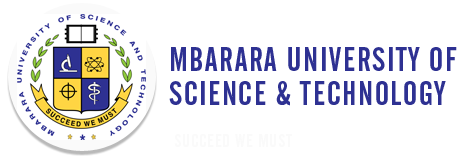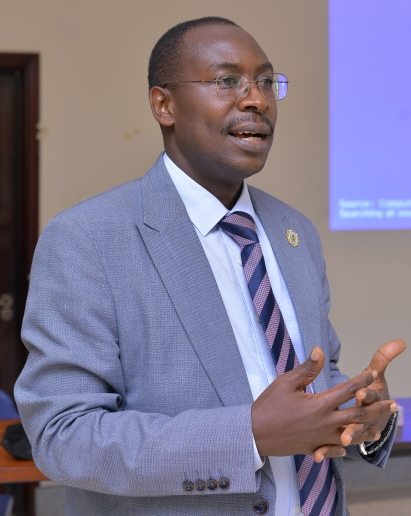
Director’s Message
Welcome to the Centre for Innovations and Technology Transfer hereafter referred to as CITT- a home for Innovations, Skilling and Technology Transfer at Mbarara University of Science and Technology (MUST). The Centre for Innovations and Technology Transfer is the latest unit to be established at MUST. The Centre was approved by the 68th sitting of the University Council in February 2018 and is mandated to coordinate, nurture and steer innovations capacity at MUST and beyond. The Centre brings together all Faculty-based innovation hubs, students innovation clubs and innovation projects operating at MUST. In executing its mandate by the University Council and in response to the MUST strategic plan and community needs, the Centre premises on enhancing the potentiality of University students and staff to innovate, co-create and generate commercially viable innovations that provide solutions to the challenges faced by the local, national and global communities. Furthermore, CITT is here to respond to the labour market demands, the skilling gap among the youths and the need for contextualizing new innovative and sustainable approaches to solving national, regional, and international challenges. At CITT, we aim at retooling and producing practical and hands-on graduates that have knowledge and skills to get absorbed in the fast-expanding industries and or with entrepreneurial skills to set up their own sustainable businesses.
ABOUT CENTRE FOR INNOVATIONS & TECHNOLOGY TRANSFER
Set up by the 68th University Council in February 2018, Centre for Innovations and Technology Transfer (CITT) is a one stop co-ordination point for all innovations, skilling initiatives and technology transfer at Mbarara University of Science and Technology. It was set up to satisfy the need to co-ordinate all University innovations, skilling and technology transfer from all faculties and students. The Centre provides overall coordination for innovations and mentors, Faculties and other academic and research units in the innovation, skilling and technology transfer ecosystem within the University.
In implementing its mandate, CITT uses a uniquely designed CITT model to support innovators from the brainstorming/prototyping stage to the technology transfer phase where the innovations are produced to physical tangible products that have market value.
CITT MODEL
Research /Innovation Training Production
MISSION STATEMENT
To create a multidisciplinary ecosystem to inspire, nurture and promote the conversion of innovative ideas into commercially viable and sustainable products and businesses.
VISION
To be a global Centre of excellence in affordable technology innovation and commercialization, skills development and entrepreneurship.
CITT CORE VALUES
- Professionalization
- Transparency
- Teamwork
- Accountability
- Creativity
- Applicability
Aim
To respond to the demands of the labor market, the need for contextualized new innovative approaches to solving regional, national and international challenges. We aim at retooling and producing graduates that have knowledge and practical skills to get absorbed in the fast-expanding industries and or with entrepreneurial skills to set up their own sustainable businesses.
Key functions / Strategic objectives
CITT carries out multiple functions born out of the mandate handed out by Council. These functions are born out of the strategic objectives CITT aims to achieve.
- To provide additional training to less skilled and unskilled graduates and prepare them to apply knowledge to experience with new skills, new attitudes and or new ways of thinking.
- To develop capacity and nurture the spirit of innovation, entrepreneurship and technology transfer among MUST Staff, Students and the community.
- To source for funding towards innovation, technology transfer, retooling and skills development activities at MUST.
- To develop partnerships between academia and industry that will accelerate innovation, technology transfer and commercialization.
- To cultivate capabilities suiting emerging job markets and build entrepreneurship spirit and business management competencies among employable groups to create employment for themselves and others.
- To establish a job recruitment and selection center for different institutions, organizations and agencies.
Activities of CITT
In order to fulfil its key functions / objectives, CITT runs a plethora of activities namely;
Activities for Objective 1: To provide additional training to the unskilled graduates and prepare them apply knowledge to experience with new skills, new attitudes or new ways of thinking
- Carrying out Training Needs Assessment (TNA) to identify skills gaps and interests of different parties
- Developing Innovation curriculum and guidelines for implementation
- Inviting the potential learners by advertising in newspapers, and reaching them through the alumni
- Identifying key result areas, tasks and competence requirements
- Retraining of the less-skilled graduates in skills and apprenticeship
- Link the retrained graduates to job market opportunities
Activities for Objective 2: To develop the capacity and nurture a culture of innovation, entrepreneurship and technology transfer among staff, student and community
- Enhancing staff capacity in grant writing, problem identification and human centered design as key ingredients for impactful innovation.
- Organizing business planning and entrepreneurship boot camps for innovators developing different products and services.
- Providing technical and practical help in the launch and commercialization of student and staff products and services.
Activities for Objective 3: To source for funding towards innovation and technology transfer activities at MUST
- CITT leads the championing of resources mobilization for innovations and technology transfer at MUST through grant writing, corporate agreements, memoranda of understanding and partnerships.
- Creating a competitive fund to support innovations with greatest promise for impact, commercial viability and technical feasibility.
- Developing and overseeing the development and implementation of a strategic and business plan for the CITT
Activities for Objective 4: To develop partnerships between academia and industry that will accelerate innovation, technology transfer and commercialization
- Linking academia to challenges affecting industry players to increase the relevance of academic research to industry through bilateral dialogue.
- Leading the translation of academic research into commercially viable companies and or products
- Linking academic research to industry for licensure, venture capital funding and investment
Activities for Objective 5: To cultivate capabilities suiting emerging job markets and build entrepreneurship spirit and business management competence among employable groups to create employment for themselves and others
- Conducting market needs assessment
- Facilitating apprenticeship and industrial attachment for the trainees
- Organizing academic-job forums and sessions that engage private sector proprietors, prospective employees, and managers
Activities for Objective 6: To establish a job recruitment and selection center for different institutions, organizations and agencies
- Setting up infrastructure for technology incubation centers
- Creating a database for graduates and other competent skilled staff
- Creating awareness and engagement of both public and private sector on potential skilled employees
- Providing consultancy services to public and private sector
Departments
Currently, CITT is comprised of three departments. The work of these departments is super specialized in as much as they work in close collaboration to support innovations from the ideation phase to the technology transfer phase.
1. Department of prototyping and technology development
The department leads the processes of problem / challenge validation, ideation, prototype development and validation testing to attain proof of concept. This proof of concept development is conducted in close collaboration and oversight from the industrialization and commercialization officer and IP officer. These officers ensure design for manufacture right from the prototype development phase and timely IP protection respectively.
2. Department of experiential learning and practical skills training
This department is dedicated to offering practical skills-based short courses to: 1) Youth and other unskilled prospective participants who require further relevant skills. The department will also focus on retooling and reskilling graduates who require practical skills relevant to the current job needs and demands. 2) Employees in the formal sector with focus on Micro, Small and Medium enterprises, and 3) Self-employed workers and apprentices in the informal sector, master artisans and cooperatives.
Innovation hubs. These are hubs housed within the different faculties that foster innovation work within the faculties. For example, , the Software Incubation Centre in the Faculty of Computing and Informatics and the Business Incubation Centre in the Faculty of Business and Management Studies.
Innovation Projects. CITT coordinates a multitude of innovation projects that are at different stages in their innovation lifecycles. Some of the Innovation Projects are at the proof of the concept phase, others at the prototype phase and some of the rest have gone on to become spin off companies. Such Projects include; Consortium for Affordable Medical Technologies (CAMTech) PHARMBIOTRAC, Simulation for Life, i-SOFT to mention but a few.
Innovation Clubs. CITT, being a centre of innovation at the University, values students as major stakeholders in the Innovation ecosystem. Consequentially, CITT takes on and curates a plethora of student clubs and associations that are focused on enhancing Innovation capabilities amongst the student body. Clubs under CITT at the moment are the i-SOFT Club and StartHub Club MUST.
MUST Innovation labs
In fostering and supporting innovators, MUST has a myriad of Innovation laboratories and demonstration sites at campus that illustrate innovators’ ideas, provide them a working space for development of their ideas and collaboration as well as providing the necessary resources for prototype development. Some of the innovation hubs are mentioned here below;
- CAMTech Co-creation Lab
The CAMTech Co-creation lab is located at town campus next to the Ophthalmology Ward. The CAMTech Co-creation lab is run by CAMTech, one of the Innovation projects under CITT. The CAMTech Co-Creation lab accepts innovators from all disciplines that have identified gaps in technology and their communities that they are working to solve. The Innovators are supported with Scientific Writing Workshops, Acceleration programs, collaborations and seed grants. This hub is an ideal place for young innovators to meet and connect.
- The i-SOFT Demonstration Site
The i-SOFT Demonstration Site is located at MUST Main Campus in Kihumuro. The i-SOFT Demonstration Site mainly supports innovations that fall within the agricultural economy. It is a centre for learning and training farmers and students in areas of modern farming techniques such as applications of organic fertilizers and organic pesticides. The Site also demonstrates a circular economy of converting biowaste from biomass into energy and protein that sustain the biomass in a circular sustainable manner. The Demonstration Site also produces bio gas and this presents potential to innovators interested in renewable energy to innovate around the areas of biogas and greenhouse impact.
The i-SOFT innovation project is titled "Linking sustainable bio-organic farming techniques to youth employability and product value addition in South Western Uganda" It practically trained 192 farmers and 93 students in 4 districts of South Western Uganda (Mbarara, Isingiro, Sheema and Kiruhura)
The i-SOFT innovation focuses on transforming bio-wastes into commercialisable and value-added sustainable bio-organic products- biogas and biofertilizer. For the first time, a 3 in 1 Organic NPK fertilizer has been developed and was launched by the Minister of Agriculture, Animal Industry and Fisheries, Uganda Hon. Frank Tumwebaze. NPK stands for Nitrogen, Phosphorous and Potassium. This fertilizer is a high quality, user friendly, cheap, and environmental acceptable bio-fertilizer that combine solid bio-slurry and phosphorous-rich Tithonia (Tithonia diversifolia) and bio-char (3 in 1 bio-fertilizer) that is hoped to be rolled out to farmers and graduates in Uganda’s Agro-ecological Zones. This technology/product is unique and the first of its kind in Uganda. As part of scaling up the innovation to address farmers’ challenges and youth unemployment, so far 192 farmers and 125 youths/students have been trained. The innovation also generates biogas which is already utilized by the rural communities. The innovation has been piloted and rolled out to farmers for its development and uptake.
Key Achievements/Results of i-SOFT at outcome and impact levels include;
- 192 farmers and 125 students have already acquired hands-on skills and practical knowledge
- 70% of the youths/farmers have now started making their own businesses as entrepreneurs and see a bright future ahead.
- Has addressed the skills gap in Uganda, address soil depletion challenges and increase agriculture productivity.
- The i-SOFT curriculum on bio-organic farming techniques has been developed and is yet to be accredited by the Directorate of Industrial Training, Ministry of Education and Sports, Government of Uganda.
- Eleven (11) bio-digesters constructed and operationalized at MUST, MBAZARDI and selected community sites
- Four (4) outreach satellite Centres for bio-fertilizer production established
- Twelve (48) community champions (23 men and 23 women) produced by MUST, MBAZARDI and BSU.
- One (1) mobile iSOFT App fully developed and 317 beneficiaries trained in its use
Key Lessons learnt FROM i-SOFT project implementation are;
- Increased knowledge and practical skills in iSOFT technology development and transfer is key for the youths
- The integration of ICT has improved appreciation and adaptation of the agriculture value chain by youths
- Start businesses through business incubation and entrepreneurship sessions has a potential to address unemployment and employability
- The cottage industry model has a strong multiplier effect
Linkages/Partnerships/collaborations out of SDF project
- National Agricultural Research Organisation (NARO)- Jointly implementing training and grant writing. Jointly implementing the VLIR-UOS MUST IUC project
- Bishop Stuart University- Have an MoU and now jointly implementing another project by VLIR-UOS, Belgium
- Biogas Solutions Uganda Limited- Still working together on biogas installations and uptake
- UNESCO-China Funds in Trust Phase III- Got some additional funding from UNESCO-CFIT which is supporting some components of the i-SOFT project
Next Steps/Going Forward for the i-SOFT project;
- We already have an i-SOFT 3 in 1 Bio-organic fertilizer (both in liquid and solid forms) ready for commercialization
- We have applied for a trade mark and certification by UNBS after which we will hit the market
- We have trained 192 farmers and 125 students and hope to scale-up and roll the i-SOFT concept to other regions of Uganda basing on soil analysis. This will increase skills and uptake.
- We are making laboratory analyses for the biogas for proper packaging and commercialization
- We are working on the i-SOFT certificate course to be accredited by the Directorate of Industrial Training
- PHARMBIOTRAC Product Development Laboratories
The Africa Centre of Excellence for Pharm-Biotechnology and Traditional Medicine (PHARMBIOTRAC) is based at the Mbarara University of Science and Technology (MUST) a public university located in Western Uganda about 286 Km from the Kampala the capital city of Uganda.
PHARMBIOTRAC always invites applications from highly motivated, talented, research-focused and qualified candidates for admission in the Study Programmes MSc and PhD (by Coursework and Dissertation) in Pharm-Biotechnology and Traditional Medicine. At PHARMBIOTRAC our goal is not just academic excellence but also development of healthcare professionals, products and services that transform societies.
Mbarara University of Science and Technology (MUST), is the second oldest public University in Uganda established by an Act of Parliament of the Republic of Uganda in 1989. The Pharm-Biotechnology and Traditional Medicine Centre (PHARMBIOTRAC) at MUST is providing a regional platform for innovative drug development, including exploring the use of traditional medicine in the region.
The goal of PHARMBIOTRAC is to build a critical mass of specialized and skilled human resource that can advance traditional medicine and Pharm-Biotechnology for socio-economic development of Africa
The unit envisages becoming a leading African centre of excellence for training and research in traditional medicine and pharm-biotechnology
The mission is to contribute to documentation, validation and value chain development of traditional medicine and biotechnology products for use in pharmaceutical and nutraceuticals industries in the region through training, research and community services for sustainable development
INDUSTRIAL VALUE CHAIN ECONOMIES
Currently, CITT is in the process of streamlining innovations at the University by integrating a variety of economies under which these innovations belong. For a start, we are integrating;
- The Pathogen economy
The Pathogen economy will be a classification of innovations under CITT that aim to improve the treatment of diseases. They include medicine and hospital equipment to mention but a few.
- The Digital economy
The digital Economy is an area of innovation with special emphasis on application of digital tools like mobile and computer applications to solve the daily challenges faced by communities. Under this, CITT will be offering the necessary support to digital innovators to grow and nurture their innovations at MUST.
- The Agricultural economy
Agriculture being the backbone of Uganda’s economy, CITT is working to ensure that necessary support is availed to students and staff working to innovate smart Agricultural practices in the agricultural value chain. Thus, the Agriculture Economy will be another area of focus for CITT.
- Energy Economy
As the world transitions to smart and clean energy, it is important that innovators working towards creating smart and cheap energy and energy consumption methods are accorded the necessary support. In this regard, CITT is preparing herself to work and collaborate with innovators working around the fields of clean energy.
- Information and Communication Economy
The Information and Communication sector connects the world every single day. Millions of bytes of data are generated daily. Innovations in the ICT sector that optimize data, provide faster connections and open up the world to newer ideas are on the priority list for support under CITT.
- Transport and Logistics Economy
Innovators in and around the area of transport and logistics are highly welcome for support under CITT. The Centre of Innovation and Technology Transfer is open to innovations that intend to produce safer means of transport, faster transport or even cheaper transport.
The beginnings of Innovative Sustainable Organic Farming Techniques (I SOFT)
The i-SOFT innovation project has been a multi-stakeholder and inter-institutional project supported by the farmer-student twinning model blended with the i-SOFT technology. The training was conducted at MUST, MBAZARDI, BSU and selected community sites using a student-farmer twinning model and experiential learning. Twinning involved pairing graduates with farmers at MUST, MBAZARDI and selected community sites under the guidance of the technical team. The technical team involved staff of MUST, NARO, Biogas Solutions Uganda and Bishop Stuart University as well as consultants in the field of biodigester systems, fertilizer production, fertilizer packaging and branding and mobile Application development. This training approach has enabled trainees learn from each other for collective outputs. Experiential learning involved a see and do model. Training was implemented in four phases guided by the training components outlined in the curriculum/manual. The training phases were approached at two levels. The first (a) trainer of trainees approach; (b) training of selected farmers and graduates/students rolled out as champions for the iSOFT innovation. In addition to the skills acquired, the qualified champions have been awarded certificates of completion. The non-qualifying trainees will be given an opportunity to retrain. The second level of training has tasked the trained participants to train more farm families in the SWAEZ.
Achievements
The i-SOFT project has achieved substantial results since its inception. Farmers and students have been equipped with knowledge and skills that are vital in improving their crop productivity and addressing the skills gap in the agriculture sector. The initial community entry meetings in the districts of Sheema, Kiruhura, Mbarara and Isingiro generated a greater understanding of the i-SOFT project concept by the selected farmers/participants; the approach and methodology of engagement of Local Government leaders; validation of the listed trainees, nomination and election of site coordinators; discussion and agreement on the training schedule and creating strategies for sustainability. This section is sectionalized according to the key project objectives/deliverables as articulated in the contract.
Development of a curriculum manual on bio-organic fertilizer technology development and application
In February 2021, an i-SOFT training manual was developed and it covered the all the four training components that include; Product development and application for students/graduates, potential farmers and implementing institutions/organizations using a University Community twinning model; Business incubation and entrepreneurship for the trainees to demonstrate the potential for technology usage and application; ICT uptake and usage for marketing and information access and; Value addition and micro agro-industrialization. The manual has a section introducing the training and the training approach and methodology. The manual will aid the subsequent training in the University and will get national approval from the Directorate of Industrial Training. The funding also equipped MUST capacity to implement the developed manual.
A drying shade has been put up at MUST Kihumuro Campus where continuous training of staff and students in bio-organic farming techniques will continue to take place. The shade contains different sections of a teaching area, a drying area, a store and office. The drying shade is connected with a water harvesting system that will support the established demonstration plots. This area is the central operational site for i-SOFT and will be supported by the other six satellite centres in Kiruhura, Sheema, Mbarara and Isingiro. Agriculture and biology students will continue to benefit from this area with more practical lessons undertaken here to prepare students with adequate skills needed in the labour market.
Development of a Bio-organic Fertilizer and Roll it out to Farmers
A 3 in 1 bio-organic fertilizer was developed, tested and adopted. The fertilizer is in both liquid and solid form and is now used by farmers to boost their agricultural productivity. Making a liquid and solid bio-organic fertilizer using local materials. Trainees learnt to make a bio-organic fertilizer using Bioslurry (generated from the biodigester), Tithonia Diversifolia and Biochar or wood ash. Trainees were also trained to generate the 3 in 1 fertilizer using a locally made tank- system for those unable to construct a biodigester system. The 3 in 1 fertilizer is a highly competitive fertilizer that contains high levels of Nitrogen (N), Phosphorous (P) and Potassium (K). The new fertilizer is an organic NPK which provides locally needed solutions to the soil depletion challenges, environmental degradation and reduced crop productivity among farmer communities. The making of the 3 in 1 fertilizer is also a solution to youth unemployment and employability question since it presents the youths with self-employment opportunities.
1.5.3 Training in Bio-fertilizer Innovation Technology Development and Application
A total of 192 farmers and students were trained in bio-organic fertilizer making and its application. Under this training component, the following aspects of training were achieved; Construction of a biodigester and its affluent separator systems, making liquid and solid bio-organic fertilizer using local materials and the application and absorption of the fertilizer.
a) Training in Biodigester Technology, Effluent Separator Systems and Installations
In February and March 2021, farmers and students were trained in biodigester technology, effluent separator systems and installations. This training was led by Biogas Solutions Uganda Limited. Trainees learnt how to construct both a fixed dome and PVC using the available local materials. This training covered the trainees in Mbarara (Ibaare, Kakoba, Kakiika), Isingiro (Masha, Isingiro Town Council and Kyeera), Kiruhura (Kashongi and Byanamira) and Sheema (Masheruka Sub County and Masheruka Town Council). As an output, eleven biodigesters that include 8 fixed dome biodigesters (01 for 15 cubic metres and 07 for 6 cubic metres) and 03 Polyethylene (PVC) bag digesters were installed at the selected sites as illustrated in Table 1 below.
The first phase of training focused on equipping trainees with innovative organic sustainable farming techniques and engaged 173 farmers and students in various domains of training. These components of training included;
- Introduction of i-SOFT innovation in the agriculture sector
- Basic guidelines for i-SOFT innovation and application
- Introduction of the bio-fertilizer technology
- Introduction of the biodigester and effluent separator construction technologies
The number of trainees exceeded the initial targeted number of 160. This is attributed to the great enthusiasm and interest that community members (farmers and students) have for the i-SOFT intervention. Indeed, the i-SOFT concept has been well received by various stakeholders such as Local Government, farmers and students. The plates below illustrate the ongoing training activities in the community.
- Making a liquid and solid bio-organic fertilizer using local materials
Trainees learnt to make a bio-organic fertilizer using bioslurry (generated from the biodigester), Tithonia Diversifolia and Biochar or wood ash. Trainees were also trained to generate the 3 in 1 fertilizer using a locally made tank- system for those unable to construct a biodigester system.
From April, we conducted professional testing for the i-SOFT fertilizer both at National Water and Sewerage Corporation and Makerere University. This process of testing was successful and yielded good results which confirmed that our raw materials contained high levels of Nitrogen, Phosphorous and Potassium
- Application and absorption of the fertilizer
One hundred and sixty-five farmers (168) trainees gained knowledge and skills on applying the 3 in 1 bio-organic fertilizer and as a result there has been a pool of success stories coming in from farmers and students who are already using the fertilizer (see the i-SOFT online video shared during the national science week).
1.4.4 Training Farmers in Business Incubation and Entrepreneurship Development
The initial target number for this training was 48 participants. Due to increased need and interest however, a total of 168 participants (99 males and 69 females) benefited from the business incubation and entrepreneurship training. The main goal of training module two was to generate a pool of agro-entrepreneurs with business ideas and skills to apply the bio-fertilizer technology and 'harvest money'. Participants were identified and hosted at CITT-MUST and MBAZARDI to incubate their agro-business ideas. Some demonstration and experimental plots were put up at 3 sites – MUST, NARO-MBAZARDI and BSU. Participants will be allocated 15 blocks space where their ideas have been incubated and developed into business products in an agricultural value chain. We also established four community-based business incubation satellite Centres that will keep monitored by the implementing Institutions. These Satellite Centres are managed by trained champions and monitored by the agriculture extension workers in the operating Sub-Counties. The training covered areas of group dynamics, marketing agro-products, pricing and costing, managing our business, savings and business sustainability and becoming good entrepreneurs.
As an incubation process and strategy and in order to show case the relevance of i-SOFT fertilizer application, MUST in partnership with NARO, Bishop Stuart University and Bio-gas solution-Uganda Ltd compared the performance of the 3 in 1 bio-fertilizer with other organically applied fertilizers, an experiment was designed with the objective of assessing performance of green dodo (Amaranthus green), common beans and kale (sukuma wiki) on applied soil amendments.
The 3 in 1 solid and liquid bio fertilizers were developed from three organic components: (i) bio slurry, (ii) Tithonia, and (iii) biochar. The experiment was established on station (MUST, NARO and BSU) that were used as replicates and blocks. The soil amendments were applied at the rate of 70 kg N/ha, which indicated that various amounts of soil inputs were used to achieve the same amount of N.
Table 5: Amounts of soil inputs applied to achieve the 70 kgN applied per ha.
|
Material |
(ton/ha) |
|
Bio slurry |
4 |
|
Cattle manure |
10 |
|
Tithonia |
1.7 |
|
3 in 1 solid bio slurry |
5 |
|
3 in 1 liquid bio fertilizer |
- |
Some of the demonstration area established
|
Dodo (Green Amaranthus) |
Common beans |
Kale (Sukuma wiki) |
The results indicate that when a farmer uses a 3 in 1 solid bio fertilizer, he will need only 50 % less by mass (5 ton/ha) of quantity of cattle manure (10 ton/ha) to get the required amounts of N for good harvest of green dodo. Nonetheless, applying only 1.7 ton/ha of leafy tithonia had good herbage that was not significantly different from either cattle manure or developed 3 in 1 bio fertilizers.
Promoting 3 in 1 solid and liquid bio fertilizers will improve crop productivity on poor soils common in smallholder farming systems. In comparison with the commonly applied farmyard manure, 3 in 1 solid bio fertilizer is easy to apply (not bulky), has higher water and nutrient holding capacity, and it is odorless. These are competitive advantages that justifies why development of i-SOFT 3 in 1 fertilizer is timely.
1.5.5 Training iSOFT ICT Application and usage
The i-SOFT mobile Application (i-SOFT App) has been developed and is now a key platform that links farmers to the trainers for agricultural advisory services and the market. The App is also an interactive platform among farmers in sharing experiences, knowledge and skills in boosting crop production and agro-marketing. The overarching goal for training component was to introduce trainees to new modern Information Communication and Technology (ICT) approaches to agriculture production. Under i-SOFT technology, we introduced a tested software mobile application called i-SOFT App that will facilitate learning and information access for farmers and farmer groups. This simple technology is user friendly and less costly. The App facilitated virtual learning for simple agricultural advisory services and marketing of the generated products. The App is supposed to strengthen the already existing, but less accessed, market information system established by Ministry of Agriculture, Animal Industry and Fisheries (MAAIF).
This training was attended by 168 farmers and students and covered the following areas of;
- Understanding the basic components of the App
- Submitting pertinent queries to the forum
- Composition of messages and uploading collected data from the field
- Uploading data collected from the field using Open Data Kit (ODK)
Seventy-eight farmers and students at training Institutions are already using the Application and it will be rolled out to over 200 users by the end of 2021 using google store. The App links farmers to the business community which will boost agriculture marketing. The App is hosted by a server run by CAMTech co-creating laboratory at Mbarara University of Science and Technology.
1.5.6 Training in product value addition and micro-agro-industrialization
Between September and October, we conducted two trainings in product value addition, fertilizer branding and packaging, certification and standardization. This training enabled 168 farmers and students to gain skills and knowledge on how to package, brand and market the bio-organic fertilizer. Most farmers now have knowledge and skills related to value addition, commercialization and micro-industrialization that are currently being touted as a basis for economic development in Uganda. This training component focused on understanding the value chains at all levels of bio-fertilizer production. These areas are prerequisites for current and future agro-industrialization. The trainees were twinned at MUST and MBAZARDI for experiential learning and gained hands-on experience of the bio-product development cycle to be able to implement their own bio-organic projects. Our trainees are now mobilized to initiate collaborative bio-businesses (as associations, cooperatives/SACCOs, and groups) that form a larger force for increased commercial production, industrialization and access to bigger markets and could acquire finances to enhance their production. This is going to supplement the enormous potential of adding value to the country’s sizeable agricultural output as a means of enhancing inclusive growth and creating productive employment across the country which the Government of Uganda is aggressively promoting at macro level.
Four community i-SOFT satellite centres and site coordinators have been established in Sheema, Mbarara, Kiruhura and Isingiro. Table 5 shows the satellite centres and attached coordinators/champions.
Table 7: Showing Trainees in Fertilizer development
|
S/N |
Satellite Training Centre |
District |
Site Coordinator |
Contact |
|
1 |
Kenshunga Mixed Farm-Kashongi site |
Kiruhura |
Gordon Kakuru |
+256 753600001 |
|
2 |
Ibaare-Nyakayojo site |
Mbarara |
Jaddress Mwesigye |
+256 771412224 |
|
3 |
Isingiro/Kyeera site |
Isingiro |
Luka Kwesigabo |
+256 783916274 |
|
4 |
Masheruka Girls School site |
Sheema |
Benard Katimbano |
+256 774163552 |
1.5.8 Other key achievements outside the project deliverables
- Laboratory support and Demonstration Plots
Equipping the MUST and MBAZARDI laboratories with tool kits that will support the training of students and farmers. A number of laboratory and office equipment have been procured and will continue to provide a supportive training ground at the implementing institutions. The equipment will be used in the development of the biofertilizer, soil moisture probing and laboratory testing while training learners beyond the project scope. The i-SOFT project has further developed the capacity of MUST, MBAZARDI and BSU staff to further engage communities in community-based solutions to agriculture challenges. The project also built the capacity of two females who were recruited at the start of the Project as the Project Administrative Assistant/Accountant Ms. Annah Amwikirize and a Training Assistant Ms. Sheilla Akampwera. The two staff have helped in supporting the Project Coordinator and Director on the day-to day running of the project activities. Three Research Assistants were recruited to assist in training and data collection. The Research Assistants are; Albert Begumanya Murinzi, Paul Kezimana and Lynette Ndyamuhaki (all students of MUST). These employees have gained advanced knowledge and skills in project management, data collection, training processes and data analysis. Three demonstration sites have been established at MUST-Kihumuro Campus, NARO-Mbarara Zonal Agriculture Research and Development Institute and Bishop Stuart University
- Monitoring Visits by Private Sector Foundation- Uganda
On March 02, 2021, a team from Private Sector Foundation-Skills Development Facility visited MUST and some of its satellite centres to monitor the project progress. The team led by Ms. Mary Kajumba met MUST i-SOFT team and its partners, conducted field monitoring site visits at MUST, Ibaare-Nyakayojo and Bishop Stuart University. Some observations were made by the Monitoring team leader on how to sustain what has been established and planned. This visit enriched i-SOFT project implementation. Another PSF-U minotoring visit by the Board was done in June 2021 led by Eng. Kasekende. We also participated in the meeting organized by Private Sector Foundation and attended by World Bank officials and we presented project progress
- National Science Week and i-SOFT Exhibitions
The i-SOFT project was nominated by the Vice Chancellor of MUST to participate in the National Science week (November 02-09, 2021) and World Science day (November 10, 2021). Together with our partners and Private Sector Foundation-Uganda, we exhibited the biofertilizer development technology at Kololo independence grounds. The Minister of Science, Technology and Innovation (MoSTI) and the President H.E Yoweri Kaguta Museveni appreciated the innovation tailored to transform farmer communities and contribute to the Parish Development Model (PMD). We were informed by the Minister and Ministry officials that there is a need for discussion with the implementers of the PMD for linkages to achieve project sustainability.
CITT is the Best Opportunity for the Innovative Minds
The society is not a static object, and so, it evolves as the human needs are in a continuous and dynamic motion. Every other day, new needs, problems and issues arise that demand for our urgent attention. Therefore, it is all upon our shoulders to devise new approaches to our daily challenges lest we face an existential threat. Maintaining traditional and rudimentary approaches to our challenges is as risky as climbing a tree while pocketing.
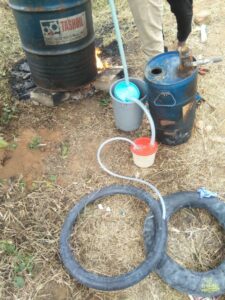
As Steve Jobs said, “Innovation is the ability to see change as an opportunity – not a threat”. Therefore, in such times when the world is at a faster acceleration, it is only appropriate that institutions of learning like universities create platforms and directorates mandated with facilitating the innovative solutions to our challenges. Fortunately, Mbarara University of Science and Technology (MUST) through the Center for Innovation and Technology Transfer (CITT) is doing nothing but perfecting this cardinal responsibility.
I am one of the beneficiaries of the 2022 CITT seed grants. CITT funded my project titled, “P2V Approach: Conversion of Plastic wastes to Fuel Oils”. Working with a group of my students, this grant enabled us to successfully design a locally made pyrolysis reactor to convert a nuisance of plastic waste into a valuable commodity (the fuel oil) in presence of a novel nano-catalyst, Nanopyroxene. We obtained the fuel oils and we are currently undertaking the laboratory stage of fuel characterization that will allow us to obtain scientific data on the chemical nature and identity of the derived oils.
As a university lecturer and an undergraduate trainer, the CITT funds did not only facilitate this project but also eased my training sessions. I was able to integrate a couple of my students into this project, something I ideally wouldn’t have been able to do without these funds. The students did not only acquire the skills but also appreciated the relevance and future of engineering innovations in addressing our day-today challenges.
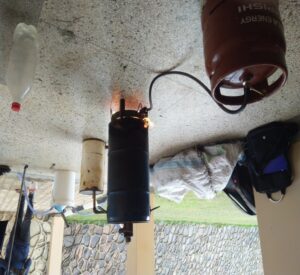
More still, CITT is not simply a funding body, but a training venue too. It is not just about the innovation as the end in itself, CITT sustains the means to the end. It offers a platform for everyone to convene and acquire the skills in scientific writing and presentation. A week- long scientific writing workshop fine-tunes an individual’s idea into a quality worth any funding. This training provides an opportunity for innovation groups to critic themselves and ultimately perfect the art and skill of not only having the clarity of the mind but also acquire the best presentation and idea pitching skills.
CITT is a merit-based platform that has the potential to further leverage MUST’s innovative success. Once facilitated with more resources, I am convinced that the low-laying innovations in our university shall come to life. Consequently, universities shall comfortably claim their cardinal role of being centers for teaching, research, and most importantly the think-tanks for innovative solutions that address our community problems
Writer: Muloogi Derick, 2022 CITT Seed grant Winner.
More testimonies
CITT Awards 6 Teams to Develop High-end Products
As part of strengthening multi-disciplinary innovation outputs at MUST, the Centre for Innovation and Technology Transfer (CITT) brought unusual smiles on the faces of 6 innovation teams. The 6 teams emerged as winners of the prestigious Product Development Award of FY 2023/2024 out of the 17 teams that competed for the Award. The teams competed through an administrative review, a product development workshop, and the final Project Qualification Review (PQR) by an independent panel of multidisciplinary judges. The funding is part of the Research and Innovation Funds (RIF) from the Government of Uganda that kickstarted in the 2022/2023 FY and has since seen 4 cohorts get Awards in the form of funding.
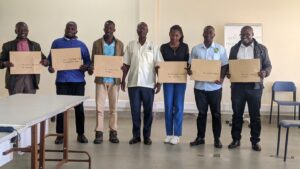
This milestone of the awarding ceremony and signing of contracts happened on Friday 20th October 2023 at CITT, Kihumuro Campus, and was presided over by the Director of CITT, Dr. Medard Twinamatsiko. Each of the six teams was awarded a total sum of UGX 16,650,000 (Sixteen million six hundred fifty thousand shillings only) to implement their innovative projects and transform their prototypes into commercially viable products.
While speaking at the awarding ceremony, Dr. Medard Twinamatsiko congratulated the teams and assured them of their unstoppable commitment to providing high-end mentorship and coaching using a new system of coaches and mentors identified within MUST and partnering institutions. He assured them that CITT is doing all it takes to establish an enabling environment for innovators to thrive as opposed to frustrating them. This was demonstrated with the establishment of an institutional innovation co-creation laboratory funded by the MUST-IUC UCoBS project with high-end equipment and facilities, the registration of the MUST holdings limited, and resource mobilization for innovations at MUST.

He further appreciated Top Management and the Government of Uganda for supporting the MUST innovation ecosystem and urged the winning teams to demonstrate value for money and address the most critical societal challenges. The awarded teams appreciated the solid and vibrant leadership at CITT and pledged to work hard and generate tangible products that will put MUST on both the national and international map.
The winning teams for the Quarter One Product Development Grant are;
|
INNOVATION TEAM |
TEAM DESCRIPTION |
TEAM LEADER |
FACULTY |
|
Enviro Buddy |
An IoT device that monitors and converts toxic emissions into eco-friendly emissions. |
Mr. Ivan Ilemut |
Applied Sciences and Technology |
|
Bran-Extra: Conversion of crop residues into valuable animal feeds |
Conversion of cereal crop waste into valuable animal feeds. |
Dr. Kintu Mugagga |
Medicine |
|
FemWell |
An early PCOS detection system |
Ms. Anita Musimenta |
Computing and Informatics |
|
ESPES |
A digital human resource platform for teaching and non-teaching staff performance monitoring in institutions of higher learning |
Dr. Pius Ariho |
Computing and Informatics |
|
MOSQILL |
An electronic device for the elimination of malaria vectors |
Mr. Denish Ayor |
Applied Sciences and Technology |
|
Dermarlic Tincture |
An anti-fungal and anti-bacterial tincture for management of fungal infections. |
Mr. Arthur Anyole |
Medicine |
UNESCO CFIT Project hosts a week-long Agriculture Entrepreneurship boot camp for Mbarara University students.
The UNESCO - China FUNDS In Trust (UNESCO CFIT) Project at Mbarara University hosted a 4-day agri-biotechnology entrepreneurship boot camp for students working on agricultural products. The Boot Camp ran from 24th to 27th October 2023 and was hosted in the Incubation Room in the FAST Building at Kihumuro Campus. The Boot Camp was opened by the Project Coordinator for the MUST UNESCO-China Funds in Trust (CFIT) project - Dr. Medard Twinamatsiko (also the Director of CITT), who introduced the UNESCO CFIT Project concept at MUST and took the participants through a session on refining their problem statement.
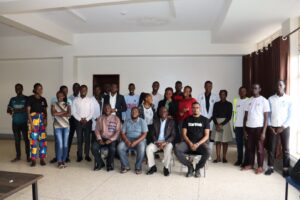
The Boot camp focused on students with innovative enterprises in the focal areas of agricultural value addition, agro-business, post-harvest handling technologies, irrigation and water management technologies, soil management systems, digital applications in agriculture, and climate-smart backyard gardening. These thematic areas fit in the UNESCO-CFIT overall goal of improving higher technical education for an innovative workforce in Africa.
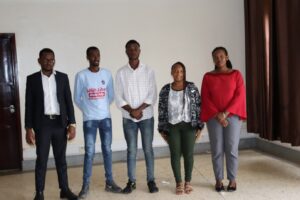
Ten student teams were shortlisted out of 65 teams, to participate in the Boot camp which was facilitated by experts from Mbarara University of Science and Technology (MUST) as well as StartHub Africa. The teams were taken through sessions in problem identification (innovating towards addressing community challenges), gathering user feedback, and iterating their products based on the users’ feedback, value proposition, and making winning elevator pitches.
The highlight of the training was the 100K challenge where each of the participating teams was given a hundred thousand Uganda shillings to come up with a few samples of their products and sell to the market within twelve hours. The participants reported that the training opened their minds to creative thinking and market penetration models for their products.
The Boot camp was closed with an awarding ceremony where the top five teams, with the most commercially viable products, were awarded a cash prize of 1 million Uganda shillings each to use as their start-up seed capital as they scale their innovative ideas to turn into micro businesses.
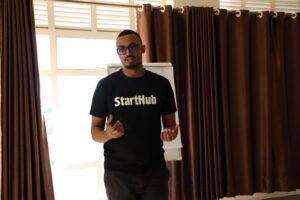
The winning teams that were facilitated with one million shillings to start their micro businesses are;
- Crop guard. This team is working on making a purely organic pesticide that is effective compared to the inorganic pesticides on the market.
- Perrisea organic body oil. The team at Perrisea is working to add value addition to cow ghee by packaging ghee and using it to make an organic body oil.
- Lemonade sip. The lemonade sip team is starting a micro business that deals in producing and selling lemonade that contains only natural sweeteners.
- Coffee Cherry Pulp. The students from the Coffee Cherry Pulp are working to transform coffee pulp that goes to waste into flour that can be used for baking.
- Mag feed. The Mag Feed team is working to improve the nutritious value of poultry and other livestock feeds by adding a rich content of protein to the feeds
We are amazed at the brilliant business ideas from the teams and wish them good luck as they start their micro businesses.
CITT FACILITATES THIRTY STUDENT INNOVATORS IN SCIENTIFIC WRITING
The Center for Innovations and Technology Transfer facilitated thirty two students in Scientific Writing over a five day Scientific Writing Workshop that started on 24th October 2022 and closed on Friday 28th October. The thirty two students were members from sixteen successful teams from fifty three teams that applied for the CITT Quarter Two seed grant of six million Uganda shillings for Innovators working to produce high tech prototypes.
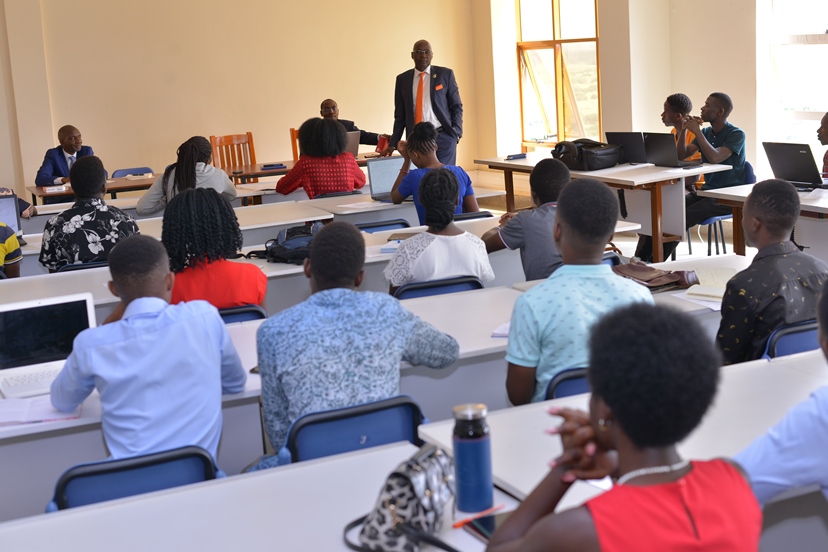
The five day workshop was officially opened by the Deputy Vice Chancellor for Academic Affairs, Prof Nixon Kamukama. He expressed gratitude to the CITT Director, Dr Medard Twinamatsiko, for diligently leading the innovation unit of the University to engage the students and staff to come up with innovations that keep MUST shining and in full glory. He urged the innovators to persevere and stay the innovation course if their innovation ideas are to see the light of day.
Dr. Twinamatsiko Medard during the opening urged the participants to utilize all the resources and the multidisciplinary team of facilitators CITT had invited to guide the innovators through the different concepts for competitive Scientific Writing. The Director also introduced Ms Laura Althaus and a team from StartHub Africa, an organization creating a movement of innovative change makers throughout Africa with whom CITT is in advanced stages of forming a partnership with. This partnership, the Director said, is meant to add to the efforts of CITT in improving the entrepreneurial capacities of students and staff at MUST to produce innovators that are ready to break into the market and a generation of graduates that are job creators. The other facilitators at the Workshop were Dr. Williams Wasswa, Dr. Baguma Kule, Mr. Dennis Lukaaya Ms. Laura Althaus and Mr. Mujuni Ivan.
Of the sixteen participating teams, three teams upon evaluation of the concepts shall be awarded the CITT Seed Grant worth six million Uganda shillings each and shall be inducted into the CITT Incubator program under which they shall receive more mentorship and acceleration for their innovations.
The participating teams were multidisciplinary from the different programs offered at the university and the innovations from each target at solving the different problems faced in society at very cost efficient methods using innovative technologies.
We are excited for the teams and wish them good luck developing their concepts into high tech prototypes and products that shall solve the different challenges faced by communities.
|
Team Name |
Team members |
Category |
|
AI Medic image viewer |
Gumisisriza Barnet |
Health |
|
A low cost auto disinfection system |
Asinguza Shine |
Health |
|
CIKOSAFE |
MbazIra Hatim Noah |
Pharmaceutical |
|
Natural medicated and eco-friendly freshener |
Masembe Edward |
Pharmaceutical |
|
Natural juice product |
Kiteyimbwa Geofrey |
Pharmaceutical |
|
Crop guard organic pest cide |
Ainembabazi Mellon |
Agriculture |
|
Converting a Petrol Motorcycle to an electric motorcycle |
Ainebyoona Wyclif |
Engineering |
|
HealCof DS: A natural Herbal Syrup for Cough and Flu |
Paul Bakowa |
Pharmaceutical |
|
Mosquito repellent |
Magala Marvin Chris |
Health |
|
A natural Oral Dental gel |
Nahurira Edward |
Pharmaceutical |
|
Sky anti acne |
Nahurira Edward |
Pharmaceutical |
|
Agri safe innovation |
Ndyamuhaki Lynette |
Agriculture |
|
UltraVioBot |
Kisakye Moureen |
Health |
|
Urine Water Extractor |
Sekakande John Baptist |
Pharmaceutical |
|
Early Stroke Detection |
Kwagala Keith Richard Kibande Steven |
Engineering |
Call for Innovation Applications 2023/2024
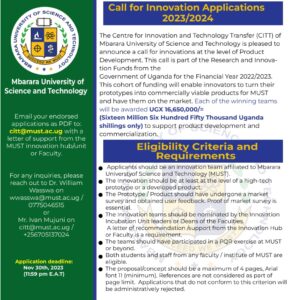
Call for applications for the financial year 2022/2023 Quarter 4
The Center for Innovations and Technology Transfer (CITT) is pleased to announce the call for applications for the financial year 2022/2023 Quarter 4. The call is targeting innovations at the level of product development.
Each of the two winning teams will be awarded UGX 16,650,000 to support product development and commercialization. The application deadline is April 19th 2023 (11: 59 pm E.AT).
